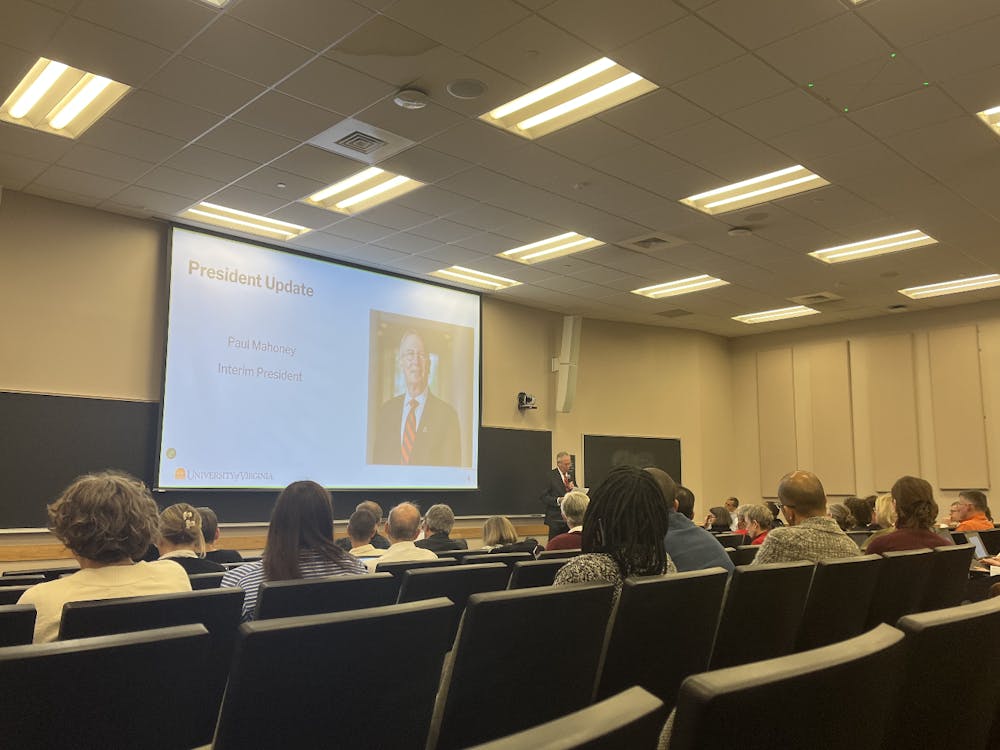The Inter-Sorority Council released a list of suggestions Tuesday regarding the fraternity Sigma Chi’s annual philanthropy event, Derby Days, including a greater focus on charitable activities, expanding the event beyond ISC sororities and changes to certain competition rules. The week-long fundraiser has attracted controversy in the past for its reliance on sorority competition and potential objectification of female participants.
The suggestions were prompted by a significant amount of input from ISC chapter members expressing concerns about the Derby Days structure, according to Zoe Denenberg, a third-year College student and ISC president.
“I sent a form out to all ISC chapter women in which they could provide tangible suggestions of how to make Derby Days more inclusive … the goal being to write a letter to Sigma Chi detailing these suggestions,” Denenberg said in an email to The Cavalier Daily. “The majority of chapters, as well as the ISC Executive Board, voted to sign on to the letter, so we decided to sign it as ‘The Inter-Sorority Council.’”
The Psi Chapter of Sigma Chi issued a statement in response, saying the organization “enthusiastically support many of the proposed changes” to the structure of Derby Days.
Derby Days has been in existence at chapters across the country since 1933, but only became philanthropic in the 1960s. It was held at the University for the first time in 1988.
Proceeds from the Derby Days nationwide are donated to the Children’s Miracle Network, a North American nonprofit organization that raises funds for children’s hospitals and medical research. The University’s chapter donates specifically to the U.Va. Children’s Hospital to support children’s leukemia research. Sigma Chi has reportedly raised over $100,000 in the past four years.
Derby Days is structured around a series of competitive and philanthropic events in which sororities compete for points. This year, Derby Days took place from March 19 to March 24, featured a house decorations contest, lip sync competition, dodgeball tournament, coin drop, and “Hat Grab” contest. Points are awarded throughout the week based on competition victories and coin drive totals, as well as “best uniforms” in events like the planned Obstacle Course and Dodgeball Tournament.
The winning sorority cosigns Sigma Chi’s philanthropic donations. This year, it was Alpha Phi, who signed the check to the Children’s Miracle Network and U.Va. Children’s Hospital.
The Derby Days model has been critiqued by some as sexist and degrading due to the nature of its competitions. Former Pi Beta Phi member and University alumna Jia Tolentino wrote a widely-circulated article for Jezebel in 2015 describing Derby Days as “the most spectacular con in all of frat philanthropy.” Tolentino criticized Sigma Chi for “[earning] an enormous institutional remission by getting thousands and thousands of sorority women to do all the work.”
In response to such critiques, ISC suggested Sigma Chi reorganize events which do not directly raise money for the University Children’s Hospital or Children’s Miracle Network. Such events include the decoration of the Sigma Chi house and a “Hat Grab Competition” — a contest where sororities compete to steal hats from pledging members and return them to the coin drop table. In their letter, the ISC asked that “such events be altered to include a money-raising component or be replaced with more productive alternatives, like reinstating the blood drive.”
The letter recommended entries in the social media competition be explicitly connected to raising donations, potentially through the use of an organization like Purpics.
Sean Fitzgerald, a third-year Batten student and Sigma Chi president, said the fraternity has sought to find a balance between direct fundraising and events to raise awareness.
“When you see kids running around with funny hats… it’s a sort of roundabout way to increase awareness and donations without overtly kind of asking for donations each time,” he said.
In addition, ISC requested Derby Days utilize an “opt-in” model for sorority participation, offering a “clear option to abstain or withdraw from the event” as to prevent sororities from feeling pressured to participate. Currently, the event uses an “opt-out” model under which sororities must take proactive steps to abstain from participating, though no sorority is actually forced to join.
“Under this current system, not participating in Derby Days alienates a chapter from the rest of the ISC community,” the letter says.
Another suggestion was to eliminate point rewards based on the quality of costumes.
“This aspect of the event perpetuates the idea that sorority women are being judged on their appearance,” the letter reads. “While sorority women may dress in costume if they so choose, it should not be rewarded with extra Derby Days points.”
The lip sync contest, a popular element of Derby Days events across the country, has attracted criticism for its objectification of female participants. In 2005, Sigma Chi reformed its sorority dance competition — the final event of the week — to include formal evaluative criteria and an impartial guest judge. In recent years, the event has been replaced with an event where sororities each coach a pledging Sigma Chi member in a lip sync competition.
“It’s something that still exists at a lot of Sigma Chi chapters, but often it turned into something that was kind of suggestive or degrading,” Fitzgerald said. “About a decade ago, our chapter revised it just because it wasn’t something that was necessarily a positive facet of the philanthropy experience at times.”
ISC also suggested expanding participation in Derby Days to other Greek organizations, such as the National Panhellenic Council, the Multicultural Greek Council and the Inter-Fraternity Council, as well as non-greek student organizations. The ISC specifically called on Sigma Chi to “lead by example” by partnering with another organization and entering a team into Derby Days 2019.
Fitzgerald said he is open to the prospect of expanded participation.
“When something’s been established for so long, people are sort of hesitant to take that risk, Fitzgerald said. “But now that we’ve talked about it with the ISC community and as a house we are certainly excited about the opportunity to expand participation, we think that it would only facilitate greater community engagement and a more inclusive and empowering experience for everybody.”
Fitzgerald expressed satisfaction with the collaboration between Sigma Chi and the ISC.
“It’s always good to get out of the echo chamber of our own ideas and to hear outside perspectives,” Fitzgerald said. “I hope that this doesn’t end with Derby Days… This is the sort of experience between councils and inside the Greek community that can be copied for other philanthropies and other chapters. We’re really excited about the opportunity to improve our own event.”
Denenberg agreed.
“Sigma Chi has been extremely supportive and receptive of this initiative. This discussion is a first step towards ensuring that all ISC and IFC philanthropies are aligned with our organizational values,” Denenberg said.







